Chinese had been tolerated and made use of for years along the Central Railway, producing vegetables from barren soil and trading at all hours in their little crowded stores. Industrious, self-effacing and thrifty, they profited where Europeans failed. And the unions wanted to be rid of them.
Anti-Asian bitterness was led by G. Potts of North Queensland who visited Barcaldine in February 1887 to address a street meeting. He met with an unenthusiastic response – or enthusiastic depending on the account reported.
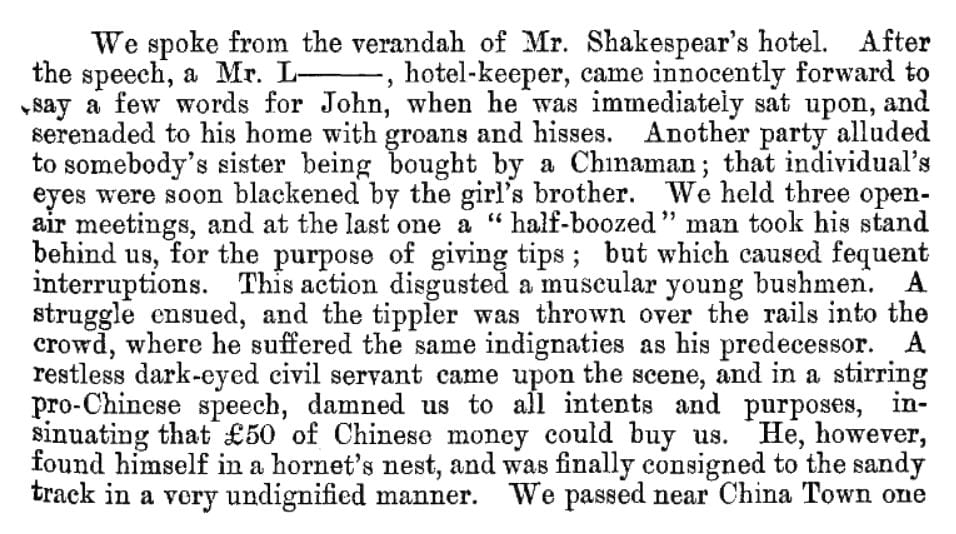
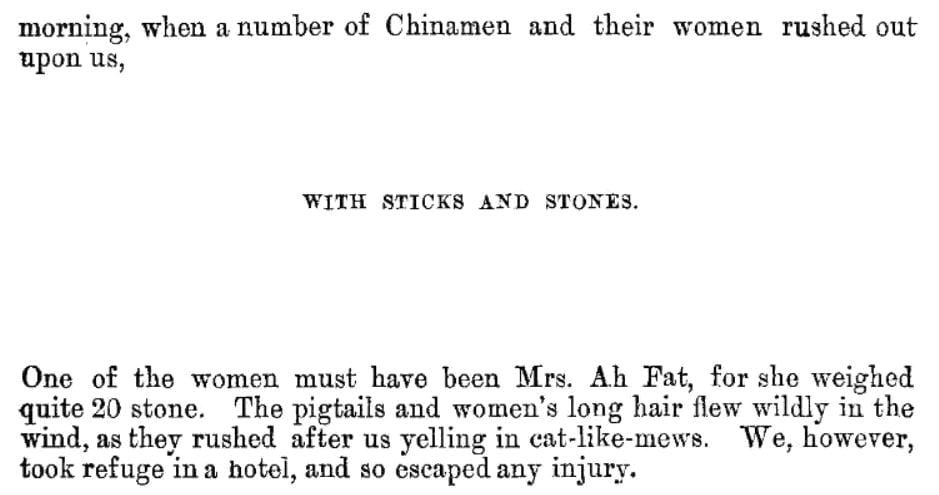
Chinese Boycott
The first concentrated action of the new unions was directed against coloured labour.
Boycotts against Chinese, firstly against employers of Chinese labour then by prohibiting dealing with Chinese traders commenced on January 1, 1889 – issued by the Shearers’ Union at the instigation of the Maritime Council of Sydney.
The Western Champion couldn’t see the logic in the action, citing examples whereby the Chinese were treated badly under the prohibition action.
As the prohibition drew near, the publicans started to dispense with their Chinese cooks, and a couple of dozen storekeepers had held clearance sales and left town. This would explain why the relatively large numbers of Chinese businesses in the early town had disappeared by the early 1900s.
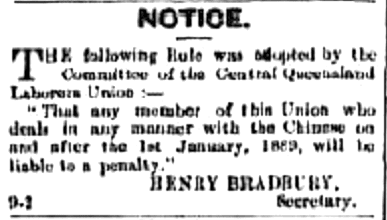
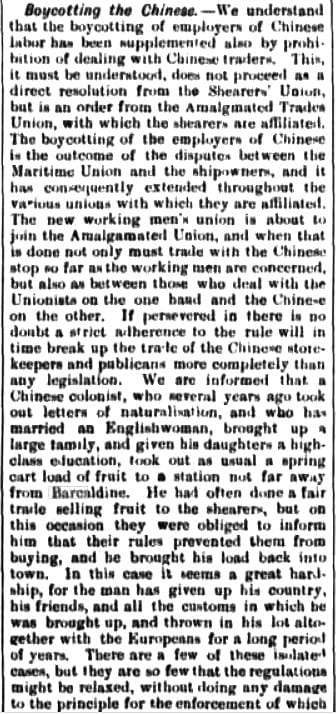
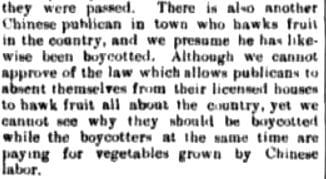
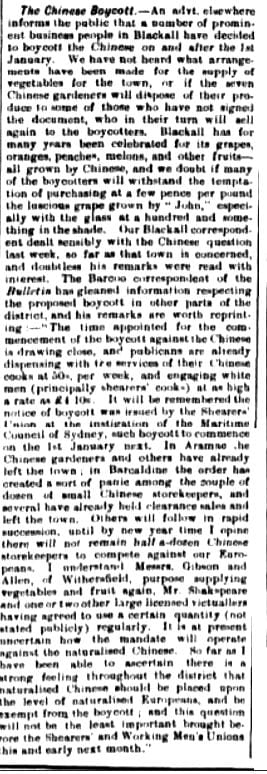
Anti-Chinese sentiment
A petition was circulated in Barcaldine, signed by nearly everyone asked, and a deputation interviewed householders asking them not to support Chinese gardeners, storekeepers or bakers. The Capricornian newspaper pointed out the Chinese market gardeners supplied the vegetables and kept the gardens going wet or dry, winter or summer so until Europeans could do the same, the writer would be purchasing their vegetables from the “Mongolian”.
During the 1891 strike, the Chinese were reported to be bringing in their garden produce ‘in fear and trembling’.
Hatred of coloured labour was not forgotten during the strike.
On 19 May 1891 disgruntled unionists took revenge by wrecking one of the main Chinese gardens. Though the culprits were caught and sentenced, the garden was ruined.
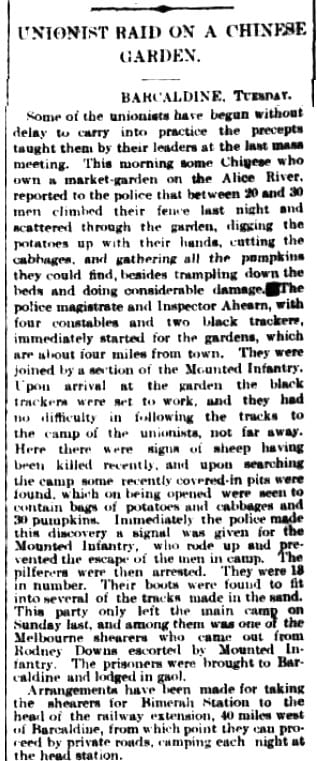
Sources include: Hoch, Isabel. 2008. Pages 18, 23, 40, 49, 91
Chinese Market Gardens
From the time of white settlement, the Chinese community succeeded in growing fresh fruit and vegetables on land near Lagoon Creek and the Alice River when Europeans failed. The gardens were on the edge of town mostly on the north side on Lagoon Creek, and the water was not free. The cost of the water was often contested – stock also needed the water.
Council occasionally made new laws about the cost of water for the gardens – but met pushback from the gardeners and those in the community who understood the necessity of the fresh vegetables supplied by the gardeners.
On one occasion when the Council staff attempted to remove one of the gardeners, they were met with an angry Ah Boo wielding an axe – so they retreated.
Mr Jimmy Ah You, a long time resident of Barcaldine, was reported to have grown a magnificient crimson double coxcombe flower, measuring 11 inches long by 7 inches across in 1913. The flower was exhibited in Mr Park’s window, and southern visitors claimed it was worthy of a Victorian horticultural show (Western Champion 15 March 1913).
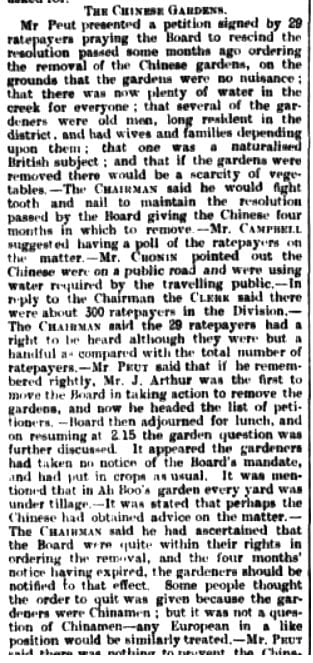
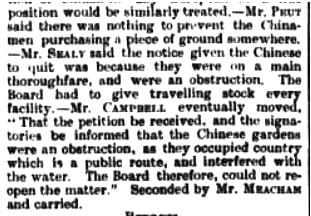
Chinese Residents and Businesses of Barcaldine
Luoi Quay aka ‘Laffie’
Late on the afternoon of Wednesday, March 26th, 1930, Luoi Quay, the then oldest identity of the Central West, died. He was known locally as ‘Laffie ‘ because of his ever jovial disposition. On 10
Quan ‘Charlie’ Hong
On 19 April, 1929 the Chinese baker and storekeeper, Quan Hong – known to locals as ‘Charlie’ – was viciously attacked in his rooms at the back of his store. He died a few hours
Ah Sam, Ah Day, Ah Sing, Fong Sang, Young Sing
Chin Min or ‘Feasting the Dead’ Ceremony A news item in The Morning Bulletin (12 April 1946) tells us that Chinese residents were still living in Barcaldine in the mid-1940s. The news item reported that
Thomas Ang Wong
Thomas Ang Wong originated from Amoy in China. He was born in Xiamen Shiqu, Fujian in 1827. On 11th September 1854 he married Emma Welton in Sydney, moving to Queensland about 1864. He set up
Ah Foo
Ah Foo Family A well-known Chinese publican, Jimmy Ah Foo (or Affoo), started out in Springsure where his family hosted a boarding house before he moved onto the northern goldfields of Queensland during the 1870s
Yung Doong
Yung Doong Yung Doong was a Chinese storekeeper, and a long time resident of Barcaldine. His store was in Oak Street about three house blocks east of Maple Street. He was also referred to as
Ah Sing, Charlie Fong, Fong Sang, Lum Bin, Tommy Yuen On, Wah Sung
Chinese settlers were in residence in the Barcaldine area well before the railway line arrived and the town was settled. I have been able to find reference to quite a number of the Chinese people,
Yung Doong – story of Chinese exhumation from Barcaldine cemetery
This is the second and third parts of the story of a Chinese exhumation reported in the Western Champion 18 April 1905. It appears there was a fair bit of confusion about the approvals process
Wah Sung
Wah Sung was a Chinese grocer/baker who traded in Barcaldine from about 1893 to 1921. His business was mixed – groceries, drapery and bakery. He also had businesses in Longreach, Emerald and Muttaburra. The Muttaburra
